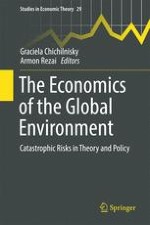2016 | OriginalPaper | Buchkapitel
Sustainable Exploitation of a Natural Resource: A Satisfying Use of Chichilnisky’s Criterion
verfasst von : Charles Figuières, Mabel Tidball
Erschienen in: The Economics of the Global Environment
Aktivieren Sie unsere intelligente Suche, um passende Fachinhalte oder Patente zu finden.
Wählen Sie Textabschnitte aus um mit Künstlicher Intelligenz passenden Patente zu finden. powered by
Markieren Sie Textabschnitte, um KI-gestützt weitere passende Inhalte zu finden. powered by
